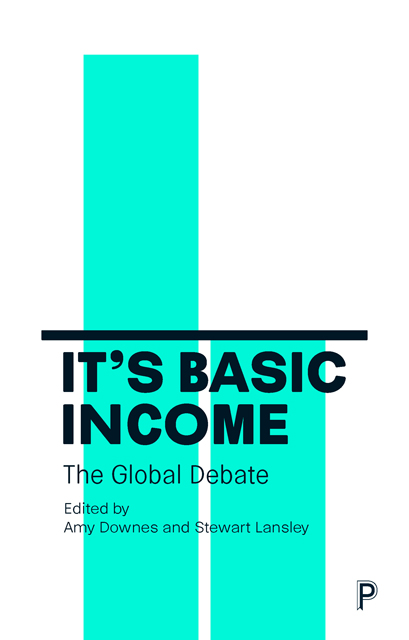38 - Building momentum
Published online by Cambridge University Press: 11 April 2023
Summary
The last few years have seen what the Paris-based OECD has called a ‘remarkable’ jump in interest in a universal basic income. Pilots, of varying forms and ambition, some funded by national governments and others by crowd-funding charities (such as Eight and GiveDirectly) and wealthy industrialists (such as those at Y Combinator), are under way in a mix of developed and developing countries. While the full impact of these pilots will not be known for some years, they are having a galvanising effect on the UBI debate. The pilots – and more may follow – represent, in themselves, a remarkable global social experiment. As well as taking place, more or less simultaneously, in a diversity of nations and continents, they are well constructed, will offer significant evidence on the potential impact of different models of UBI and are being very closely observed.
What binds supporters of a basic income, and many of the contributions in this book, is its potential to plug some of the holes in existing systems of social security, and to offer greater social protection in an era of growing work insecurity and risk. But a UBI also does much more than this. Many contributors – from Insead’s Eduardo Rodriguez-Montemayor in Chapter 2 to The Leap Manifesto’s Avi Lewis and Katie McKenna in Chapter 12 – talk of how, by encouraging greater choice and strengthening labour’s bargaining power, a UBI would empower citizens and help meet growing public demands for a fairer society. In Chapter 23, Philippe Van Parijs argues that a UBI’s guaranteed income floor – below which no-one would fall – should be central to the renewal of social democracy.
Nevertheless, a UBI is not, as one contributor puts it, ‘a magical solution’. It will help deal with some of the fault lines of today’s economic and social systems, but not all. It is therefore important, as several contributors have cautioned, that the case for UBI is not overstated, and that it is clear that a UBI would need to be accompanied by other reforms targeted at issues like work insecurity, stagnant and falling wages, and the growing concentration of wealth ownership. There are also many different models of a UBI, while actual schemes would need to be tailored to different tax systems, social cultures and stages of development.
- Type
- Chapter
- Information
- It's Basic IncomeThe Global Debate, pp. 200 - 204Publisher: Bristol University PressPrint publication year: 2018



